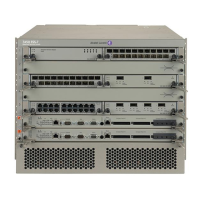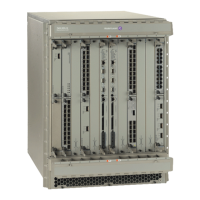Filter Policies
Router Configuration Guide 477
→ sdp — forwards the incoming traffic onto the specified VPLS SDP. Supported
for ingress IPv4/IPv6 and MAC filter policies deployed in VPLS service. The
SDP traffic is to egress on must be in the same VPLS service as the incoming
interface. If the configured SDP is down, traffic is dropped.
• forward “isa action” — ISA processing actions allow operator to permit ingress
traffic and send it for ISA processing as per specified isa action. The following isa
actions are supported (see CLI section for command details):
→ gtp-local-breakout — forwards matching traffic to NAT instead of being GTP
tunneled to the mobile operator’s PGW or GGSN. The action applies to GTP-
subscriber-hosts. If filter is deployed on other entities, action forward is applied.
Supported for IPv4 ingress filter policies only. If ISAs performing NAT are
down, traffic is dropped.
→ nat — forwards matching traffic for NAT. Supported for IPv4/IPv6 filter
policies for L3 services in GRT or VPRN. If ISAs performing NAT are down,
traffic is dropped. (see CLI for options)
→ reassemble — forwards matching packets to the reassembly function. Supported
for IPv4 ingress filter policies only. If ISAs performing reassemble are down,
traffic is dropped.
→ tcp-mss-adjust — forwards matching packets (TCP Syn) to an ISA BB Group
for MSS adjustment. In addition to the IP filter, the operator also needs to
configure the mss-adjust-group command under the L3 service to specify the
bb-group-id and the new segment-size. Requires FP-2 line cards and chassis
mode D.
• http-redirect — implements HTTP redirect captive portal. HTTP GET is forwarded
to CPM card for captive portal processing by router. See HTTP-redirect (Captive
Portal) section for further details.
In addition to the above actions:
• An operator can select a default-action for a filter policy. The default action is
executed on packets subjected to an active filter when none of the filter’s active
entries matches the packet. By default, filter policies have default action set to drop
but operator can select a default action to be forward instead.
• An operator can override default action applied to packets matching a PBR/PBF
entry when the PBR/PBF target is down using pbr-down-action-override.
Supported options are to drop the packet, forward the packet, or apply the same
action as configured for filter’s default-action. The override is supported for the
following PBR/PBF actions:
→ forward esi
The following table defines default behavior for packets matching a PBR/PBF filter
entry when a target is down:
